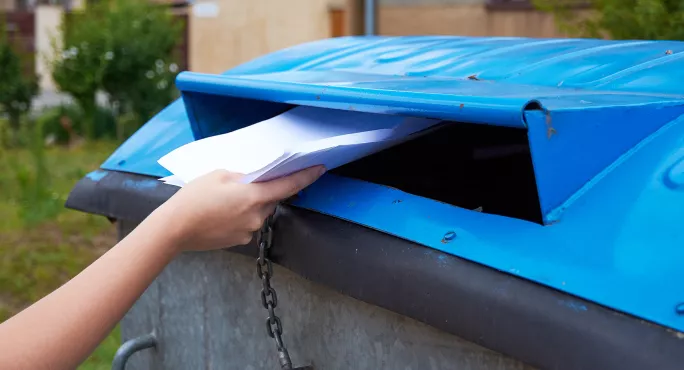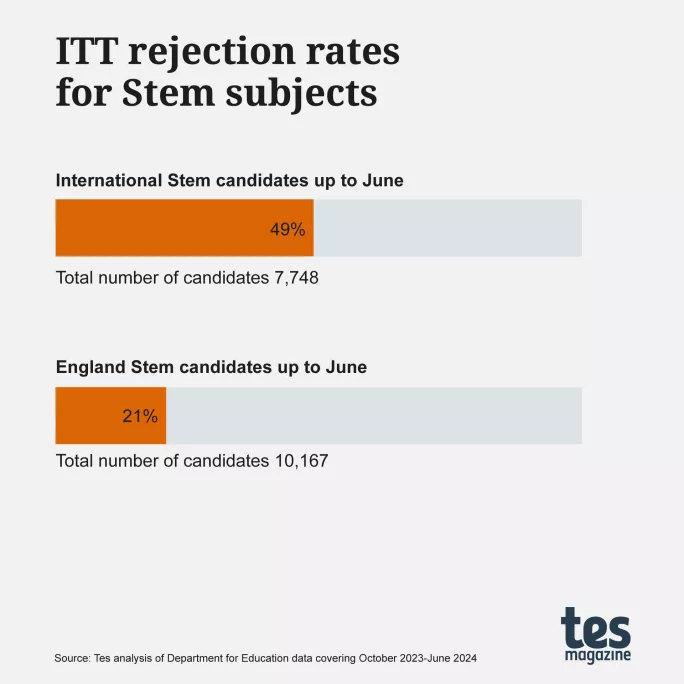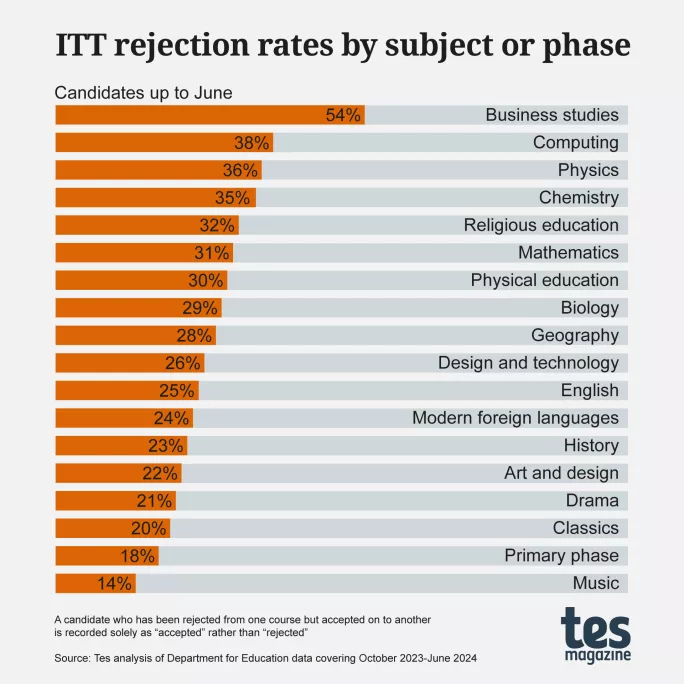Revealed: Third of Stem teacher trainee applications rejected

A third of applicants to teacher training courses in Stem (science, technology, engineering and maths) subjects have been rejected this year, Tes analysis reveals.
The findings come amid spiralling concerns about Stem teacher shortages, and after the government doubled its levelling up payments for early-career Stem teachers in a bid to improve retention and fill staffing gaps.
Experts say the findings show that an increase in international candidates this year is failing to tackle “chronic teacher under-supply”, and that the profession must be made more attractive to potential applicants in England.
The findings have also prompted fears that higher Stem bursaries are discouraging candidates from applying to subjects they are better matched to.
This is the first year that the collection and publication of Department for Education data has allowed rejection rates for individual subjects to be calculated.
Teacher training: high rejection rate for Stem
Tes’ analysis shows that, since October, 18,331 candidates have applied to an initial teacher teaching (ITT) course in the Stem subjects of physics, chemistry, biology, maths or design and technology - of whom 6,017 (33 per cent) were rejected.
As things stand, the government is on track to miss its target for the recruitment of postgraduate Stem teacher trainees by 43 per cent, according to expert forecasts.

Of the five subjects with the highest rejection rates, three - computing, physics and chemistry - are Stem subjects.
This has been driven largely by a high proportion of unsuccessful applications from international candidates, our analysis reveals.
Since October 7,748 international candidates have applied to Stem ITT courses, of whom almost half - 3,806 - were rejected.
- International applicants: Over one in four teacher trainee applicants are from overseas
- Teacher training: ITT providers “under pressure to take unsuitable candidates”
- Teacher shortages: Warning over “endemic” use of non-specialist teachers
Stem candidates from England were far more likely to be accepted, with only a fifth being turned away.
A similar gap can be seen when looking at applicants across all subjects, with 42 per cent of international candidates and 19 per cent of applicants from England being rejected.
Tes analysis earlier this year revealed that more than a quarter of ITT applicants were from overseas, many of whom were unsuitable, according to providers.
Jack Worth, school workforce lead at the National Foundation for Educational Research, said the “big increase” in international applicants - especially in subjects like physics, computing, chemistry and business studies - “has been a significant contributory factor to higher rejection rates”.
He added: “International applicants are less likely to be accepted on to training courses, so this trend has not appreciably helped address chronic teacher under-supply.”
And Mr Worth called for a key part of any future government’s workforce strategy to be a “more balanced focus on making teaching more attractive to all potential applicants - particularly domestic, as well as international”.
Tes revealed earlier this year that the government was looking at how it could boost schools’ international recruitment to plug teacher gaps.

The government is currently on track to miss its target for the recruitment of postgraduate teacher trainees by 32 per cent, according to expert forecasts.
So far this year more than 40,000 candidates have applied to train as a teacher overall, with half of those accepted on to courses, according to the latest government data covering the 2023-24 academic year up to this month.
A fifth have been rejected, while the remainder are still awaiting a decision, are yet to accept an offer, have been deferred or have withdrawn their application.
Overall, business studies teacher training courses have the highest rejection rate. Of the 940 candidates so far this year, less than half (46 per cent) have been accepted.
The rejection rate is 38 per cent for computing, with 629 out of 1,668 candidates being turned down.
More than a third (36 per cent) of candidates who applied to train to teach physics were unsuccessful - 1,572 out of 4,406.
This high rejection rate comes amid increasing concerns about physics teacher shortages, with less than a fifth of the target number of trainees being recruited on to courses over the past two years.
Tes analysis earlier this year revealed a 351 per cent rise in applications submitted to physics ITT courses from international candidates this year.
Despite the boost in candidates, the subject is predicted to miss its target by 74 per cent this year.
Chemistry candidates, meanwhile, are being turned away from courses at a rate of 35 per cent, with 875 of the 2,475 total candidates who applied rejected.
The subject with the fifth highest rejection rate is religious studies, for which a third of candidates were rejected.
Shortage of maths teachers
Meanwhile, almost a third of candidates who applied for maths teaching courses (31 per cent) were rejected.
The subject has received increased attention in the past year after prime minister Rishi Sunak announced a plan to provide maths to all pupils until 18.
This is despite schools often struggling to recruit in the subject, with research suggesting that almost half of secondary schools are using non-specialist teachers for maths lessons.
Commenting on Tes’ analysis, Emma Hollis, chief executive officer at the National Association of School-Based Teacher Trainers, said that the “unprecedented surge in applications from overseas early on in the cycle” included many candidates who were “unsuitable”, with a high proportion of those being Stem candidates.
Rob McDonough, CEO of East Midlands Education Trust, said that the East Midlands Teacher Training Partnership, which is part of his multi-academy trust, tends to get a lot of applications from international Stem candidates. He added that this could be due in part to the large bursaries being offered in the subjects, which some international students can be eligible for.
On teacher supply, Mr McDonough said: “We are down across the board in terms of teacher recruitment this term, and trying to find computing teachers is nigh on impossible.”
Do the high rejection rates in shortage subjects suggest that the bar is being set too high? The government wrote to ITT providers last year citing concerns over high rejection rates.
And providers have previously warned of a “legacy” of government “pressure” to ”recruit at all costs” amid a teacher supply crisis.
James Noble-Rogers, executive director of the Universities Council for the Education of Teachers (UCET), said that ITT providers “will always recruit suitably qualified candidates with the potential to be good teachers if they have the capacity to do so”, and that the problem lay with the quality of applications.
He also pointed to the government’s decision to cut back funding for subject knowledge enhancement (SKE) courses.
This decision “will mean that some applicants who could have been recruited following completion of an SKE programme no longer can be”, Mr Noble-Rogers said.
He warned that high bursaries in Stem might be “encouraging people to apply for Stem rather than for subjects which are a closer match to their qualifications and experience”.
The DfE announced last year that in 2024-25 the highest bursaries (£28,000) will be available for chemistry, computing, mathematics and physics, while biology and design and technology will offer £25,000.
Geography and languages will also receive the £25,000 offer, while art and design, English, music and religious education can get £10,000.
Primary has lower rejection rate
Some 2,601 candidates for primary ITT courses - a fifth of the 14,285 applicants - have been rejected so far this year.
While primary recruitment has raised concern in recent years, this is countered to some extent by falling pupil rolls, with primary pupil numbers in state-funded schools set to plummet by more than 410,000 over the next five years.
Recruitment to primary ITT courses fell by 17 per cent year-on-year from 10,640 in 2022-23 to 8,844 this year, but the government almost met its target (96 per cent) after it was lowered.
However, next year experts have predicted that the primary target will be missed by around 14 per cent.
Among other subjects, classics, drama and art and design have a rejection rate of around a fifth, while history, modern foreign languages, English and design and technology are closer to a quarter.
Just 14 per cent of candidates who have applied to music teacher training courses so far this year have been rejected: 69 out of 499.
The DfE data only records a candidate’s most successful ITT application attempt. This means a candidate who is rejected from one course but accepted on to another is recorded solely as “accepted”.
The DfE has been contacted for comment.
For the latest education news and analysis delivered directly to your inbox every weekday morning, sign up to the Tes Daily newsletter
You need a Tes subscription to read this article
Subscribe now to read this article and get other subscriber-only content:
- Unlimited access to all Tes magazine content
- Exclusive subscriber-only stories
- Award-winning email newsletters
Already a subscriber? Log in
You need a subscription to read this article
Subscribe now to read this article and get other subscriber-only content, including:
- Unlimited access to all Tes magazine content
- Exclusive subscriber-only stories
- Award-winning email newsletters
topics in this article



